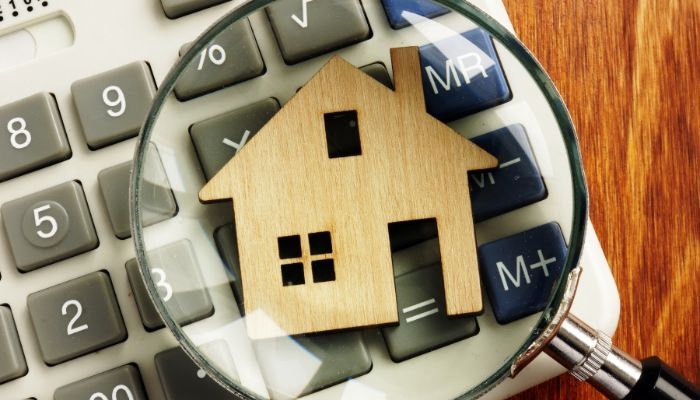
How To Calculate The Value Of Your Home
Jump To
Are you ready to get a handle on the worth of your residence? It can be a daunting task, but it doesn’t have to be! Here’s the lowdown on how to figure out the value of your home.
As a homeowner, there are so many factors that come into play when determining what your humble abode is worth. You might feel like you’re playing detective while trying to assess all of these components but fear not – we’re here to guide you through this process and make sure you end up with an accurate appraisal.
Whether you’re just curious about the current value of your home or need an official estimate for a refinance or sale, understanding how the calculation works is essential. Let’s take a closer look at how to calculate the value of your home.
Assess Location
When it comes to calculating the value of your home, location matters! Where you live can have a big impact on what your home is worth. That’s why the first step in assessing the value of your home is to research the local area.
By looking into what homes nearby are selling for, you can get an idea of how much your own property might be worth. This will also help you understand any potential improvements that could add more value and increase the sale price.
It’s easy to do this research – just use online resources like Zillow or Trulia to compare prices in your area. It’ll give you a better idea of what market trends are like and how far up or down you should expect your property value to go. And with that knowledge in hand, you’ll be better informed when it comes to evaluating the true worth of your home.
Research Local Home Prices
Getting an accurate read on the value of your home requires you to take a deep dive into your local housing market. Researching local home prices is essential for understanding what your property should be worth in the current climate. Doing this diligently will help ensure you get an accurate assessment of your home’s worth.
This involves taking a look at similar properties in the area and noting their listed values or sale prices. You’ll want to consider all the factors that can affect the price, such as number of bedrooms, condition, size and lot size. It’s also important to keep note of any recent renovations or upgrades that have been made to homes nearby – if other homeowners are investing money in their properties, it could mean a higher value for yours too.
It’s like piecing together a jigsaw puzzle – there are lots of elements that need to be taken into account before you can understand the whole picture. Take some time to do thorough research and it will certainly pay off when you come to calculate your home’s value. Next up: calculating home square footage!
Calculate Home Square Footage
I’m now onto the next step in calculating the value of my home. This involves calculating the square footage. This is an important part because it gives an idea of how much space I have to work with, and therefore how much the property is worth.
The first thing I need to do is measure each room, including any hallways or stairs. I should also take into account any outbuildings such as a garage or shed. It’s important to be as accurate as possible – this means measuring every wall, even parts that are curved or angled.
Once I have got all my measurements, I can multiply them together to get the total square footage of my home. This number will give me a good indication of the size of my property and help me determine its value more accurately. But it doesn’t tell me anything about its condition – for that, I’ll need to make an estimate next…
Estimate Home Condition
Discovering the value of your home can be daunting, but with due diligence, you can have an accurate estimate. Deciphering the condition of your home is the fourth step in calculating its worth.
Assessing the state of your house requires both a subjective and an objective evaluation. Subjectively, take a look at the overall appearance – are there any signs of wear or tear? Are there signs of disrepair? Are there any updates that need to be made? Objectively, consider things like age and upkeep: what type of roof does it have and how old is it? Is the HVAC system up-to-date and functioning properly?
Regardless of whether you’re familiar with construction or not, these details still matter when determining your home’s value. TIP: Before putting your home on the market, make sure to repair any minor issues (like chipped paint or broken door handles) and clean thoroughly – this will increase its perceived value drastically!
Consider Special Features
I’m now onto the fifth step in estimating my home’s value: consider special features. I want to make sure I don’t overlook any factors that could increase my home’s market value. This can include things like an updated kitchen, a pool, or a finished basement. Even if I haven’t updated these features myself, they can still be taken into account when calculating the worth of my home.
Anything that sets my house apart from other properties in the area should be noted, as it can make it more desirable to potential buyers. For instance, if my neighborhood is full of similar homes but mine has an upgraded kitchen or a large backyard deck, that could add to its overall value. The opposite is also true; if there are features in my house that are outdated compared to others in the area, this should be taken into account as well when determining its worth.
It’s important for me to remember that this step of evaluating special features doesn’t just apply to changes and upgrades I’ve made myself – it includes anything that makes my home unique from others on the market. Keeping this in mind will help me get an accurate estimate of what my home is worth when I’m ready to sell it. Now, let’s move on to considering how old my house is and how much wear and tear it has experienced over time.
Estimate Home Age
Next up, it’s time to estimate the age of your home. This is important because older homes have less value than newer homes. The age of a home can be determined by looking at the condition of the roof, windows, and other features such as HVAC systems. You’ll also want to check for any information about when the home was built in public records or city databases.
It’s also wise to look at other homes in your neighborhood and compare their ages with yours. This can give you an idea of what comparable homes are valued at in your area. If your home is significantly older than the others, you may need to adjust its value accordingly.
Looking at the age of your home is just one step in estimating its value. Now it’s time to move onto determining which improvements have been made over the years and how they affect the overall worth of your property.
Determine Home Improvements
Ah, home improvements – the bane of every homeowner’s existence. But what are they actually good for? Well, let me tell you: they can drastically increase the value of your home! So, if you’re looking to make a big return on your investment, you should definitely consider sprucing up your house.
Here are a few ways to determine which home improvements will add the most value to your property:
- Assess condition: Take a look around and ask yourself what needs work. Check for any areas that may be outdated or in disrepair and make an honest assessment about how much money it would take to repair them.
- Research current trends: Look online or talk with local real estate agents to get the scoop on what’s popular right now. This will help you decide which upgrades will give you the biggest bang for your buck.
- Consider future buyers: Think about who might be interested in buying your home down the line. Do some research into their preferences and tailor any improvements accordingly.
It may seem like a daunting task, but determining which home improvements will be worth it is essential if you want to maximize the value of your property. Plus, it doesn’t hurt that you’ll end up with a nicer looking place too! Now that we’ve got that covered, let’s move on to analyzing local market trends…
Analyze Local Market Trends
It can be tempting to skip this step, especially if you’re in a hurry to figure out your home’s value. But analyzing local market trends is an important part of the equation – it’s essential for getting an accurate estimate.
The best way to get a clear picture of current market trends is to look at the prices of comparable homes recently sold in your area. You can access this information from public sources like real estate websites or from your local assessor’s office. This data will give you an idea of how much similar properties are worth in your neighborhood.
Once you have an understanding of what comparable homes are selling for, you’ll need to consider any factors that may affect the value of your own house – such as its condition, location, and amenities. These can all play a role in determining how much potential buyers would be willing to pay for it. Then, armed with all this information, you’ll be ready to start using online calculators and other helpful tools to calculate the value of your home.
Use Online Calculators
I’m sure you’re wondering what the next step is. Well, it’s time to use online calculators! This is a great way to get an initial idea of your home’s value. And there are plenty of tools out there that can help.
One option is to search for ‘home value calculators’ online and look at the results. These will give you an estimate of your home’s worth based on current market values and trends in your area. You’ll also be able to see what comparable homes in your neighborhood have recently sold for.
It’s important though to remember that these online calculators should only be used as a starting point. They can give you a good idea of how much your home is worth, but they don’t take into consideration things like renovations or unique features that could add extra value. So, it’s always best to do some research and take into account other factors when estimating the value of your home.
Hire A Professional Appraiser
Well, if you’ve reached the point of scratching your head about the value of your home, it might be time to bring in the professionals. Hiring a professional appraiser is the next step in calculating your home’s value.
Appraisers are like detectives when it comes to finding out what your home is worth. They take into consideration a variety of factors that can affect the value of your home such as:
- Neighborhood and location: How desirable is it? Are there any schools or parks nearby?
- Structure and condition: Is the roof in good shape? Does the plumbing work? Are there any additions or renovations made recently
- Comparable sales: What were similar homes sold for in the area recently?
An appraiser takes all these factors into account before giving you their assessment of what your home could be worth. Their expertise will be able to give you an accurate picture of where you stand when it comes to determining a sale price for your property. It may cost a bit more than just using an online calculator, but having a reliable estimate can be worth its weight in gold.
Conclusion
The value of your home is an important consideration when it comes to buying and selling. Knowing the market value of your home can help you make informed decisions about the best time to list or buy a property. By understanding the local appreciation rate and researching current home values by using resources such as Home Mortgage Guides, you can get a better sense of what your home is worth. Additionally, don’t forget to consider any tax benefits associated with owning a home, as they could have financial implications for you and your family.
Buying or selling your home is a major decision and one that should not be taken lightly. As such, it’s important to do your research and take all factors into consideration before listing or purchasing a property. Doing so will ensure that you get the best deal possible – one that not only meets your needs but also fits within your budget.
Ultimately, by taking the time to calculate the value of your home, you can make more confident decisions about buying or selling real estate – decisions that will benefit both you and your wallet in the long run!
FAQs
How Do I Determine The Market Value Of My Home?
Figuring out the market value of my home can feel like a daunting task. But, with the right information and tools, it’s totally doable. The first step is to look at what homes in the area have recently sold for. This will give me an idea of how much similar homes are worth and will provide a benchmark for pricing my own house.
Next, I need to assess my home’s condition and features to determine how it compares to others on the market. Are there any cosmetic updates or improvements that could add value? Doing a deep dive into these details is important so I can get an accurate estimate of my home’s worth.
Finally, I should consider hiring a professional appraiser or real estate agent who has experience in the local market. They know current trends and can help me understand what buyers are looking for in this area– giving me even more insight into my home’s potential worth. With their help, I’ll be well on my way to calculating its value!
When Is The Best Time To List My Home For Sale?
It can be tempting to list your home as soon as possible, especially if you’re eager to move on. However, there are certain times when it is best to wait and maximize the value of your home. By understanding the market conditions and timing your listing appropriately, you can ensure that you get the best price for your home.
Firstly, it’s important to research current market trends in order to determine when is the most advantageous time to list your home. During a sellers’ market, where demand is high and inventory is low, homes tend to sell quickly at higher prices. Conversely, in a buyers’ market, with more homes available and fewer buyers, prices may not be as high.
You should also consider other factors such as seasonal trends that may influence the sale of your property – for example, many people start house hunting in the spring or summer months after wrapping up their tax returns. Knowing when local demand for homes typically increases can help you time your listing strategically in order to capitalize on this trend.
By investing some effort into researching the local market and seasonality trends prior to listing your home for sale, you can make sure that you get the highest price possible for it. Taking these steps will go a long way towards ensuring that you have a successful sale.
What Should I Do If I Don’t Agree With The Appraised Value Of My Home?
Well, if you’ve been trying to work out the value of your home and you disagree with the appraised amount, it can be a real head-scratcher! But don’t worry, I’m here to provide some guidance.
Firstly, if you want to challenge the appraised value of your home, there are a few steps you can take. The most obvious one is to get another appraisal from a different professional – so that’s worth considering. You could also look into recent sales in your area and compare them to the original assessment. Finally, it might be worth speaking directly with the appraiser who made the initial assessment and politely requesting an explanation of their process.
However, when doing any of these things, it’s important to keep in mind that appraisers must adhere to certain standards – so chances are they’re already working within those boundaries. That being said, if you feel like there are extenuating circumstances for why your home should be valued differently then by all means explore other options! It never hurts to do your research – after all, this is about making sure that you get what you deserve for your property.
What Is The Average Home Appreciation Rate In My Area?
One of the most important steps in determining the value of your home is understanding the rate of home appreciation in your area. I’m sure you’re wondering, “What is the average home appreciation rate in my area?” This is an important question to ask when evaluating your property.
The answer to this question varies depending on many factors, from local market conditions to national trends. For instance, if there has been a recent boom in housing prices, that could lead to higher appreciation rates than normal. Additionally, if there’s an influx of residents or businesses moving into your area, it could also affect local values. It’s important to research and understand these factors before making any decisions about the value of your home.
To get a better idea of what kind of rates you can expect, it’s recommended that you consult with a real estate agent or appraiser who specializes in your particular area. They will be able to provide more accurate information based on their experience and knowledge of the market. This can give you a clearer picture of what kind of appreciation rate you should expect and help make sure that you get an accurate appraisal for your property.
Are There Any Tax Benefits Associated With Owning A Home?
Are you curious to find out what tax benefits come with owning a home? Well, the answer is yes – there are several! From mortgage interest deductions to property tax deductions, being a homeowner comes with plenty of advantages. Let’s look at some of them in more detail:
- Mortgage Interest Deductions: With this deduction, you can deduct the interest payments made on your mortgage from your taxable income. This is applicable up to a loan amount of $750,000 and can be claimed by filing an itemized return.
- Property Tax Deduction: Homeowners may also be able to deduct their property taxes from their taxable income. Depending on the state that you live in, you may even be able to exempt up to half of your property tax bill from your taxable income.
- Home Sale Exclusion: When selling your home, you may be eligible for the home sale exclusion program. Under this program, homeowners may exclude up to $250,000 (or $500,000 if married) worth of gain on the sale of their primary residence from their taxable income.
These are just a few of the many benefits that come with being a homeowner. From reducing your overall tax liability to potentially saving money on capital gains taxes when selling your home – there are so many advantages that make it worth considering!
Get A Pre-Approval Today!

Home Mortgage Calculator


Leave a Reply